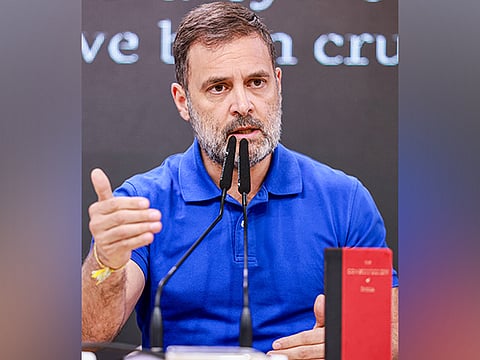

Quality education cannot be achieved through privatisation and financial incentives, Congress leader Rahul Gandhi asserted, emphasising the need for greater government spending on education and stronger public institutions. This was stated in a report by PTI.
During an interaction with students of IIT Madras, Gandhi addressed several pressing issues, including the changes he envisioned for the country’s education system.
"I believe it is one of the foremost responsibilities of any government to guarantee quality education to its people. This cannot be achieved through privatisation and financial incentives. We need to spend a lot more money on education and strengthening government institutions," he shared in a post on X, alongside an edited video of his conversation.
Explaining the difference in approach between the Congress and the Bharatiya Janata Party (BJP), Gandhi said, "The Congress and UPA generally believe that resources should be distributed more fairly and growth should be wider and inclusive. The BJP is more aggressive on growth. They believe in what, in economic terms, is 'triple-down.'"
On social harmony, he added, "We feel that the more harmonious society is, the less people are fighting, the better it is for the country."
When asked about higher education, Gandhi reiterated the importance of public institutions. "I don't think the best way to guarantee quality education is to privatise everything. Frankly, when you bring financial incentives into the game, you don’t actually give quality education. The best institutions in our country are government institutions, yours (IIT Madras) being one of them. I argue for much more money being spent on education by governments."
Sharing his concerns about the education system, he remarked, "I have serious problems with the way the country's education system is set up. I don’t think it allows the imagination of our children to thrive. It’s a very restrictive, top-down system... very narrow."
Reflecting on insights from his Bharat Jodo Yatra, he recounted, "I talked to thousands of children and asked them what they wanted to become. They said lawyer, doctor, engineer, or army soldier. It can't be that there are only five things to do in this country. But that's what our system is pushing."
Gandhi criticised the focus on a narrow definition of success, stating, "Our education system measures success only if one becomes an engineer, doctor, IAS/IPS (Indian Administrative Service/Indian Police Service) officer, or joins the forces, which applies to just one or two per cent of the population. The system should allow kids to do what they want and experience multiple things."
He highlighted the undervaluation of many professions, saying, "Our education system disregards and undervalues many professions while overvaluing these four or five. Those are the types of things I would like to change."
On international relations, Gandhi emphasised the importance of balancing India’s relations with China and America. "In a situation where two superpowers are going head to head, we have a balancing ability. If India intelligently navigates this dynamic without making a major mistake, we could benefit significantly."
He also advocated for fostering innovation through production. "One of the things I want to push is moving more into the physical production space. To me, real innovation comes from that space. Put as much money as you want in R&D (Research and Development); if you’re not producing, it’s just a budget."
Gandhi concluded by stressing the need for a system that respects skills and invests in them. "Innovation comes when we push for it and respect the skills involved in actual production."
